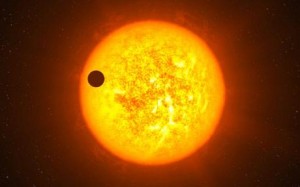
An exoplanet has been observed 1,500 light years from Earth that is similar in temperature with those in our own solar system. The planet, named CoRoT-9b is unique so far to our current understanding of exoplanets goes, and according to Dr Hans Deeg one of the astronomers in Tenerife who verified the discovery, it will remain an object of reference for at least the next ten years.
The difference between the 400 exoplanets discovered so far and CoRoT-9b is that it has an orbit similar to that of Mercury, it is the same size as Jupiter and with its “temperate” range of surface temperatures ranging from -20 and 160 degrees Celsius it equates with existing planetary models developed from our own solar system. By comparison Dr Deeg says other exoplanets are more ‘exotic’. “They are either extremely hot, being very close to the central star on short orbits, or they are on eccentric orbits, taking them close to and far from the central star, giving them extreme temperature.”
The discovery was made by observing the planet’s transit across its star over a period of 145 days. Results were then compared to observations made from Earth observatories such as the Teide Observatory in Tenerife. The importance of this transit method of observation was highlighted by Professor Heike Rauer of the DLR Institute in Berlin, which is managing German contribution to the mission. “Once you have observed an exoplanet in transit, you can determine its radius . . . Not only that, but transiting planets also provide an opportunity to learn something about their atmosphere. This is the key to the search for Earth-like planets.”
CoRoT-9b was identified by the CoRoT satellite, which was launched in 2006 on an international mission led by the French Space Agency, Centre National d’Etudes Spatiales, and which includes researchers from the European Space Agency, Germany, Austria, Belgium, Spain, and Brazil. In February 2009 the satellite, which is in Earth polar orbit, succeeded in identifying a rocky exoplanet, CoRoT-7. The discovery of CoRoT-9b now has ensured that the mission is extended to 2013. public service.co.uk

Leave a Reply
You must be logged in to post a comment.